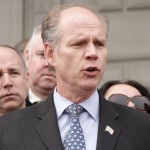

Eric Massa, Christopher Lee, Anthony Weiner and Michael Grimm – which of these names is unlike the others? What do their similarities and differences portend for the 11th Congressional District special election?
All four were members of Congress from New York who resigned in disgrace upon revelations of personal misconduct and replaced via special elections. The first three, however, resigned in sex (or at least cybersex) scandals while Grimm resigned after pleading to guilty to felony tax evasion. (Eric Massa resigned in March 2010 following accusations of sexually harassing male staffers, Christopher Lee resigned in February 2011 when his sexually charged email exchange with a woman other than his wife was revealed and Anthony Weiner resigned in June 2011 after disclosure of his sexting escapades.) Unlike his three predecessor resignees, however, Republican Michael Grimm appears to remain quite popular in the district, having won reelection overwhelmingly this past November while under federal indictment.
Massa, Lee and Weiner were all replaced by a candidate from the opposite party, but given Grimm’s enduring popularity that’s not an overly instructive historical fact. There are, however, lessons for the current candidates in those prior elections, particularly in the Lee and Weiner races. (Massa resigned during the 2010 campaign and a special election and the regular general election were simultaneously held on November 2, 2010. The Republican who won both the special and general elections was already a candidate when Massa resigned. Both the Lee and Weiner replacements were, like this 11th CD special, stand-alone elections drawing increased attention.) As a side note, I canvassed for Hochul and Weprin in those elections and my analysis reflects my unscientific observations from knocking on hundreds of doors in those two districts.
The victorious candidate in both the Lee and Weiner replacement races framed what the election would be about, riding a single issue to victory. The resigned predecessor in each race was a drag on their respective party-mate, but neither race really focused on the departed. That’s a key starting point for Democratic candidate Vincent Gentile, who can’t simply count on voters moving away from Grimm and his party. A Gentile victory is possible (we’ll look at the numbers in a later post), but only if he sets the election terms.
In the Lee race, Democrat Kathy Hochul’s campaign was a referendum on the future of Medicare. The recently unveiled “Ryan budget” had proposed dramatic changes in Medicare and the Hochul campaign effectively focused on that as the campaign centerpiece. The seat had never been held by a Democrat, but Hochul galvanized voter worries over the possibility of radical changes to a program deeply established in American life into victory. She didn’t offer a meaningful alternative, but made the election a “yea or nay” on the national Republican proposal.
In the Weiner race, Republican Bob Turner seized on President Obama’s relationship with Israel and what Turner attacked as Obama’s insufficient support for Israel. In one of the more remarkable recent elections Turner, an Irish Catholic who had never been to Israel, defeated David Weprin, an observant Jew who strongly and actively supported Israel and who had visited Israel multiple times. What mattered on election day wasn’t their respective personal histories, but the clear issue framing provided by Turner.
That’s the vital lesson for both candidates – setting the question voters will answer is the key to victory. It’s a challenge for both candidates, but particularly for Democrat and early underdog Gentile. With a mayor, governor and president of his own party and a well-known and liked opponent he’s deprived of some obvious targets. Any Gentile hopes of victory depend on choosing wisely among the other possibilities such as House Republicans and their Tea Party driven agenda or Staten Island Republicans and the woes of the three immediate past Republicans holding this seat. He’s already signaled that he’s not seeking to make the election about the Eric Garner case. For Donovan, it’s mixed. The Democratic mayor is unpopular in the district, but the Democratic governor and president carried the district in their most recent elections. He may consider essentially choosing sides in the ongoing House Republican battles between Tea Party and establishment members, but that potentially carries a defensive element. He appears more in line in terms of policy and personality with the establishment Republicans, but essentially running against the Tea Party faction of House Republicans may bring its own challenges.
Stay tuned as we keep a close eye on the emerging race and who best frames the question voters will answer on May 5th.
